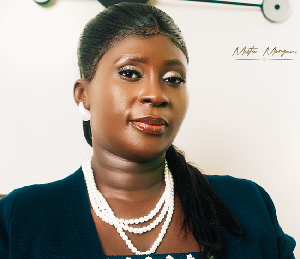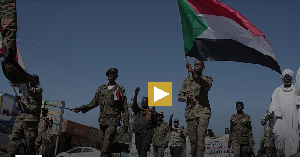More than 12,000 Liberians still live in a refugee camp outside Ghana's capital Accra, nearly 20 years after the start of Liberia's long civil war. But some refugees remain and they have concerns about going home.
Walking around the Buduburam refugee camp, it looks more like a thriving neighborhood. On the main street, music blares out from every direction. There are no tents, only brightly painted houses along with churches, barber shops, and food stalls.
"On this street people normally meet, to chat and interact with their friends," said Richlue Burphy, a youth leader in the camp. He is 24 years old and has lived here most of this life. Recently his family moved back to Liberia, but he stayed in Ghana to finish college. Walking around, every block, somebody greets Burphy.
When the war in Liberia started, a committee created by the Ghanaian government set aside this land for the incoming refugees. For two decades, thousands of people have made the Buduburam camp their home.
Today, the government of Ghana has started building a police and fire station on the refugees' soccer field, leading a lot of people in the camp wonder what will happen next.
"There are a lot of rumors going around, everyone are on the alert," said Richlue Burphy. "You know, for the notice being short there, everyone of us are conscious about it . But as to where the notice will say we are going, no one can determine that."
The United Nations has moved from handing out food to everyone when the camp was established, to supporting schools and job training in the camp. Burphy says today refugees mostly rely on themselves or each other to get by.
"Almost everything that you do in the camp involves money," said Burphy. "Most of us do not have source of funding. So you see us moving from friend house to friend house to see what is there if your friend has something."
More people are returning to Liberia. But that is not an easy choice. Chairman of the Buduburam Refugee Welfare Committee, Varney Bamolay Sambola says part of it depends on conditions back home.
"Like housing when they get back to Liberia, how do they deal with housings? There must be room to create a cordial atmosphere between the locals, because some of them made you to leave the country. Maybe they would not want you to see them, they would not want you to expose them, they can eliminate you," said Sambola.
Even though it is hard to go back, Sambola says people cannot be refugees forever. He says one day the international community will decide they are no longer eligible for help.
"They will come officially, they will say look, those conditions that made you to leave Liberia do not exist in Liberia any longer. Therefore you cannot claim to be a refugee any longer," he said.
The United Nations is helping people move back to Liberia, if they want to. Nearly 8,000 already have. Now there are signs posted in the camp saying the rest of the refugees will be moved to different parts of Ghana. But Lisa Quarshie of the U.N. refugee agency, says nothing is decided yet.
"For now we are waiting on the government of Ghana to basically make a decision on the future of Buduburam camp. We will look at it in context of how it benefits the refugees, and we will go along with that," she said.
But one thing is for sure, most refugees do not want to stay in Ghana, even if they are moved out of the camp. Burphy says a big problem is the language barrier between Ghanaians and Liberians.
"Even when we want to buy from them, we do a lot of sign language. You point at the thing you want. Maybe you take the quantity you want. You give the money they give your change. So whether you are getting the right change you do not know," said Burphy.
Many refugees hope to migrate to a Western country, where they think it will be easier to make money, before returning to Liberia permanently. In the end, Burphy says the final destination for him will be Liberia.
"You feel that if I am going through such hardship, it is better I can better endure it if I am home, where I will have a lot of family members around me," said Burphy. "Someone who you can sit down and explain your problems to and they understand you, than someone who you try to talk to and then they do not even understand you."
Burphy is waiting to finish his university education before he moves back to Liberia. He says he needs to prepare before he takes the big step.
General News of Friday, 4 December 2009
Source: VOA












